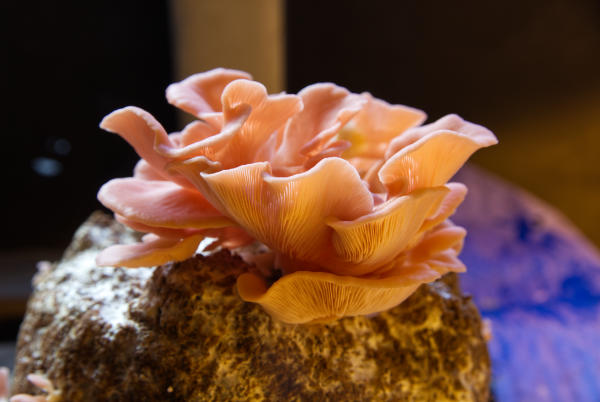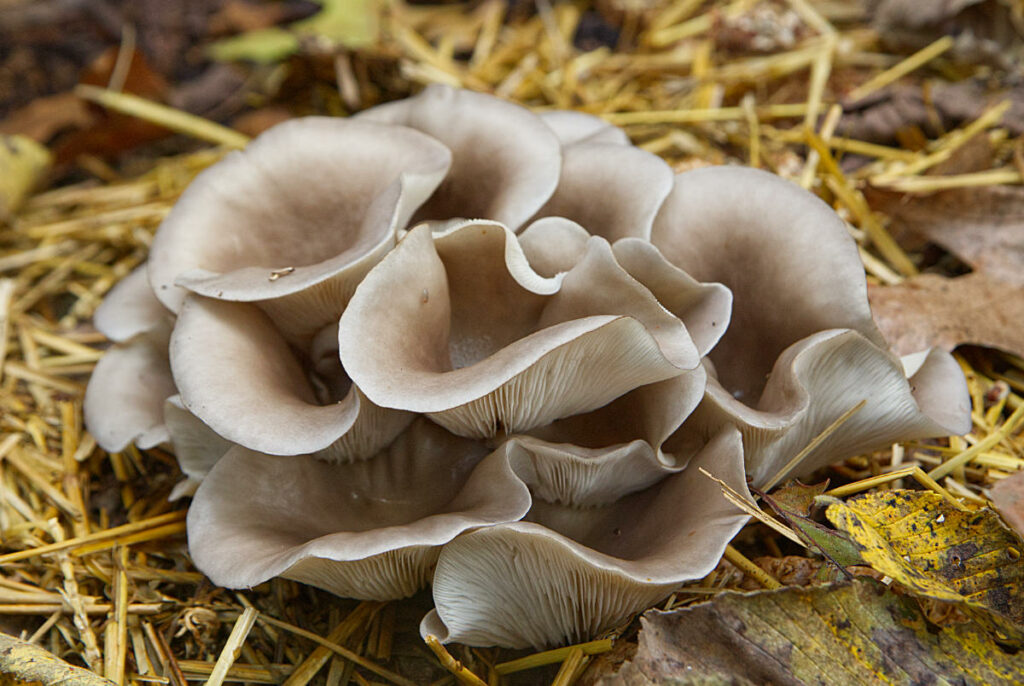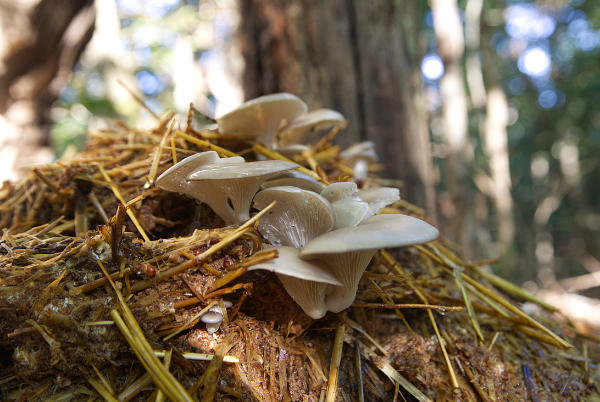
As many of you who read our posts know, we are working hard to get our mushroom farm up and running. Oysters are some of the mushrooms we are growing, so I wanted to cover some of the benefits of oyster mushrooms nutritionally and how they may be able to affect your health.
What Are Oyster Mushrooms?
Mushrooms are a type of fungi. Oyster mushrooms are known as decomposers because they grow on dead and dying wood. They help to break down the wood and return it to the soil.
Fungi are more closely related to humans than to plants. They take in oxygen and expire carbon dioxide, just like we do. They are a vital part of the biosphere. If not for these mushrooms, and fungi like them, the Earth would be covered in a deep layer of dead organic matter.
Oyster mushrooms are a species of fungus known as Pleurotus. They are a type of gilled mushrooms. They are known as oyster mushrooms because the caps resemble an oyster when they mature.
There are around 40 varieties of oyster mushrooms. Each variety can have slightly different nutritional values, but all contain basically the same nutritional profile.
Types of Oyster Mushrooms
While there are around 40 types of oyster mushrooms there are a few that are popular for use in cooking. These include:
- Blue Oyster – Blue oyster mushrooms are a common type that is grown commercially and can also be found growing in the wild. They grow well in cooler weather. The caps are a deep blue when young and fade to grey as they mature.
- Pearl Oyster – These are the most common oysters you will find growing in North America while foraging. They are an off-white color when they mature.
- Pink Oyster – The pink oyster is another commercial type that has a beautiful pink color. The color fades when cooked. The flavor of this oyster has been compared to bacon, especially when cooked properly.
- Golden Oyster – Another commercial variety you may see at Farmer’s Markets. They are a lovely yellow to golden color. They are very delicate and don’t ship well, so you rarely see them in grocery stores.
- Phoenix Oyster – Also known as the Italian oyster. They are similar to the pearl oyster, with slightly smaller caps. These are also the only oyster mushroom in the US that grows on softwood such as pine. All the other varieties grow on hardwood trees.
- King Oyster – The largest of all the oysters. Native to the Middle East, Asia, and North Africa. These are also now being grown commercially.

The Health Benefits of Oyster Mushrooms
Mushrooms in general have amazing benefits for nutrition and overall health. Oyster mushrooms are no different. They contain vitamins, minerals, and other compounds your body needs to function at peak efficiency. Mushrooms are high in fiber while containing few calories or fat, and no cholesterol. A 1-cup serving of oyster mushrooms contains around 28 calories. It contains 5 grams of carbs, 3 grams of protein, 2 grams of fiber, and only 1 gram of fat. This makes it a truly delicious and healthy addition to your meals.
Let’s drill down deeper into the particular benefits of oyster mushrooms. Remember, these are general benefits that have been looked into and studied. Each individual has a unique biochemistry so your results may vary. I will provide sources for these benefits so you can read the studies for yourself if you want additional information.
Nutrient Rich
Oyster mushrooms are high in minerals your body needs to function at peak efficiency. They contain significant amounts of the minerals iron, potassium, zinc, calcium, and phosphorus. They also contain the vitamins B1, B2, Niacin, Folic acid, Vitamin C, and Vitamin D.
Heart Healthy
Oyster mushrooms contain the mineral potassium. Potassium is necessary for the proper functioning of cells, the nervous system, the heart, and skeletal muscles.
The oyster mushroom contains about 2.8% lovastatin by dry weight (Source). This substance helps to regulate the production of LDL cholesterol (so-called “bad cholesterol”) so it may help prevent the build-up of plaque in the coronary arteries.
Oyster mushrooms also contain beta-glucan. This substance also helps regulate cholesterol levels in the blood. This is another of the benefits of oyster mushrooms.
The niacin content in oyster mushrooms also helps to regulate cholesterol levels and balance triglyceride levels in the blood. It also helps reduce the production of histamine in the body, which is responsible for inflammation and allergic responses.
Good Source of Antioxidants
Antioxidants in the diet can help to combat the formation of oxygen free radicals in the body. These are a form of reduced oxygen that can damage cells and cause a host of problems. These include premature aging of the skin, damage to vital organs such as the heart, and may even be a cause of some cancers.
Oyster mushrooms contain a substance called plueran (Source). This polysaccharide is a potent antioxidant and immunomodulator. It has also been found to help with the prevention of upper respiratory tract infections in athletes and children.
Good Source of Vitamin D
You may be aware that your body produces Vitamin D when exposed to sunlight. But did you know that many people in high latitudes may become deficient in Vitamin D, especially during the winter months? Oyster mushrooms are a good dietary source of Vitamin D that can be consumed to help replace the lack of Vitamin D of those who don’t get enough by exposure to sunlight. Oyster mushrooms can contain up to 166% of the recommended daily amount of Vitamin D.
Vitamin D is required by the body to aid in the absorption of calcium in the intestines to help maintain bone health, helps to maintain proper muscle function, and may help to protect against respiratory disease in children, some cancers, osteoporosis, cardiovascular disease, neurodegenerative disease, and diabetes (Source).
Good For Dieters
Oyster mushrooms are low in calories and fat while containing high levels of protein. This makes them a good replacement for meat in the diet when cooking. They also have a meaty texture which makes them excellent for use in dishes that you would normally prepare with meat.

How to Use Oyster Mushrooms
Now that you know the benefits of oyster mushrooms you may be wondering how you can add them to your meals to reap the benefits. You already read that you can substitute them for meat in dishes, but they are also fantastic when added to other dishes you may not have considered.
Here are a few suggestions you can try:
- Add them to Oriental dishes like stir-fry
- Roast them in the oven and add your favorite seasonings
- Pan-fry them with butter and season to taste
- Add them to soups or stews
- Use them in omelets, add them to scrambled eggs, etc.
- Add them to gravy for a savory mushroom gravy
- Add to roasts when you add vegetables
- Dehydrate them to make mushroom jerky
- Add them to pasta or rice dishes
- Make pickled mushrooms
Head over and download this FREE recipe for Beef Pepper Steak with Oyster Mushrooms. This dish is both delicious and good for you!
I also found a recipe that uses them in the traditional green bean casserole that is invariably served during the holidays. You can find the recipe here.
If you want to try growing your own mushrooms most people find that purchasing a ready-to-grow kit is the easiest way to get started. You can purchase the kits from this page.
Be sure and check out all the informative articles on our Natural Living Blog.
FAQs:
Q: What are oyster mushrooms?
A: Oyster mushrooms are a type of edible mushroom that is known for their delicate texture and mild, nutty flavor. They are a common ingredient in many cuisines around the world.
Q: What are the types of oyster mushrooms?
A: There are several types of oyster mushrooms, including the blue oyster mushroom, the golden oyster mushroom, and the pink oyster mushroom. Each type has a slightly different flavor and appearance.
Q: What are the health benefits of oyster mushrooms?
A: Oyster mushrooms are a nutrient-rich food that offers several health benefits. They are a good source of antioxidants, vitamin D, and heart-healthy nutrients. They are also low in calories and fat, making them a good choice for dieters.
Q: What nutrients are in oyster mushrooms?
A: Oyster mushrooms are a good source of protein, fiber, and several vitamins and minerals, including vitamin D, potassium, and calcium.
Q: How are oyster mushrooms heart-healthy?
A: Oyster mushrooms contain compounds that can help lower cholesterol and blood pressure, which are two important factors in maintaining heart health.
Q: How are oyster mushrooms a good source of antioxidants?
A: Oyster mushrooms contain compounds like ergothioneine and glutathione, which are powerful antioxidants that can help protect the body against damage from free radicals.
Q: Are oyster mushrooms a good source of vitamin D?
A: Yes, oyster mushrooms are one of the few natural food sources of vitamin D. They produce vitamin D when exposed to sunlight, just like human skin.
Q: Are oyster mushrooms good for dieters?
A: Yes, oyster mushrooms are low in calories and fat, making them a good choice for people who are watching their weight. They are also high in protein and fiber, which can help you feel full and satisfied.
Q: How can I use oyster mushrooms in cooking?
A: Oyster mushrooms can be used in a variety of ways in cooking. They can be sautéed, roasted, grilled, or stir-fried. They can be used as a meat substitute in dishes like vegetarian stir-fries, soups, and stews. They can also be used as a pizza topping or in omelets and frittatas.